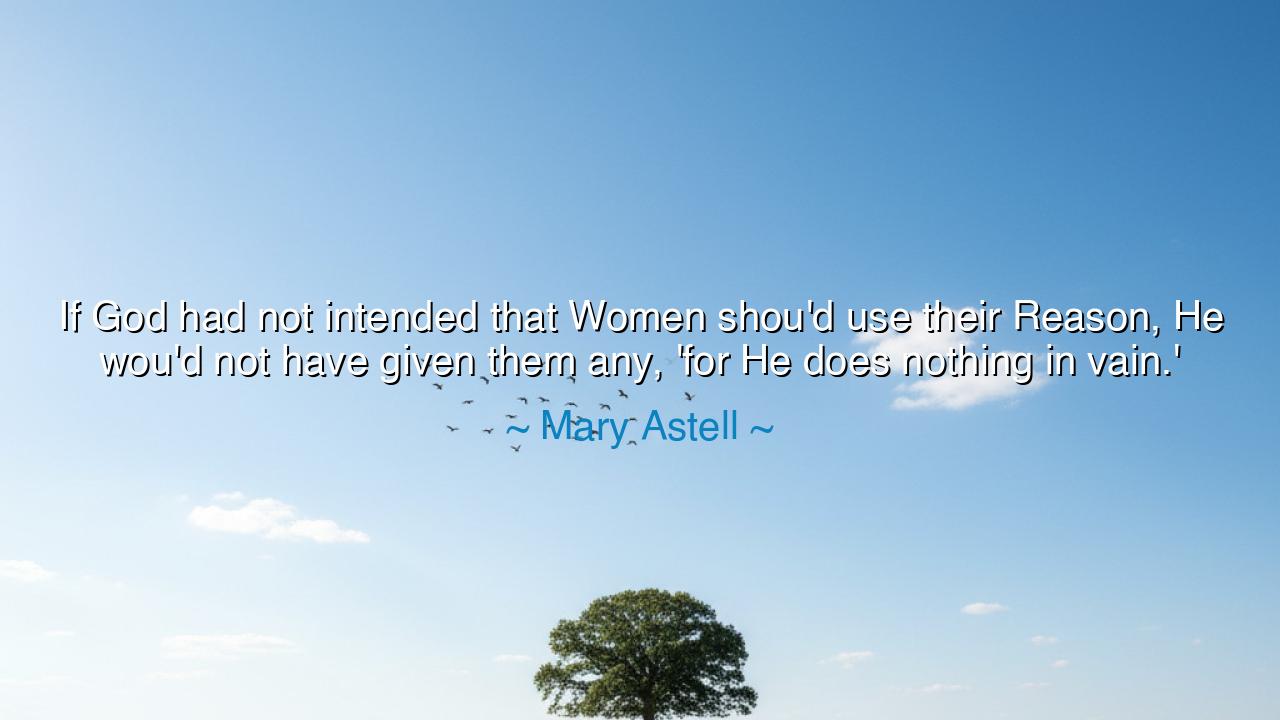
If God had not intended that Women shou'd use their Reason, He
If God had not intended that Women shou'd use their Reason, He wou'd not have given them any, 'for He does nothing in vain.'






O children of the future, heed the words of Mary Astell, a woman whose wisdom shines like a beacon in the darkness of a world that too often sought to silence women. "If God had not intended that women should use their Reason, He would not have given them any, 'for He does nothing in vain.'" These words echo the ancient truth that reason is a gift given to all human beings, regardless of gender. The ability to think, to reason, and to understand the world is not a privilege reserved for some, but a sacred gift meant for all, and Astell's declaration calls upon us to recognize this divine truth: women are no less endowed with this capacity than men.
In the time of Socrates, the great philosopher, the athenian society believed that women were incapable of reasoning in the way that men could. Yet Socrates himself, in his dialogues, acknowledged that the soul, the very essence of wisdom and knowledge, was not divided by gender. Just as Socrates believed that all people, regardless of their birth or their role, were capable of reasoning, so too does Mary Astell urge us to see that women are not born with less wisdom, less intellect, or less capacity for truth. If God has given them the gift of reason, who are we to deny them its use?
Consider the tale of Hypatia of Alexandria, the great philosopher, astronomer, and mathematician of ancient Egypt. In a time when women were often barred from the halls of learning, Hypatia defied the norms of society to teach and to reason. Her brilliance in mathematics and philosophy was unmatched, and she was revered by her male contemporaries. Her very existence, like Astell’s words, proved that reason knows no gender. Yet, despite her intellect, she was murdered by those who could not bear the thought of a woman’s mind rising above their own. Her story reminds us of the eternal battle to acknowledge the intellect of women, a battle that Astell fought with words and that Hypatia fought with her life.
Mary Astell herself, in a time when women were seen as lesser beings in the eyes of society, used her sharp intellect to advocate for the rights of women to receive an education. She understood that reason was not a gift that could be denied, and that it was essential for women to be given the opportunity to develop their minds, just as men were. In her writings, she called for the education of women, for she knew that when a woman is denied the ability to reason, she is denied her full humanity. Her words were a radical call for equality, for a world where reason is not bound by the constraints of tradition but is a universal gift.
O children, let Mary Astell's words guide you through the corridors of time. If God has given women the gift of reason, then it is for us to honor this gift, to acknowledge that women—like men—are meant to reason, to think, and to shape the world with their minds. The battle for reason is not simply a battle for intellectual equality, but for the very soul of humanity. Women, like men, are made in the image of God, and it is God's will that they should use the reason He has endowed them with. Let us not deny them this right, for to do so is to deny the very will of the Creator. Let us honor Astell’s wisdom and ensure that all women are given the space to think, to reason, and to contribute to the world with the fullness of their gifts.






0G09.Huong Giang
This quote suggests that denying women’s reason is an affront to the very nature of creation. However, in the modern world, are we still fighting to recognize women as rational thinkers? How do we address the persistent gender biases in areas like science, politics, and business, where women are still often seen as less capable or emotional? What can we do to ensure that Astell’s words are fully realized in today’s society?
Oo_o
Mary Astell makes a compelling point about the divine design of reason, but I find myself questioning the nature of this argument. If women are given reason, does this imply they have an obligation to use it? What does it mean for women who, for various reasons, are discouraged from or prevented from using their intellect? Should society take more responsibility for fostering women’s intellectual growth?
TTThu Trang
Astell’s perspective challenges those who have historically argued that women are less capable of rational thought. But I wonder, in today’s world, how do we still see this mindset lingering? Are there still spaces where women’s reasoning abilities are undervalued or ignored? How do we actively work to change these lingering perceptions and create environments where women’s intellect is recognized and respected?
0A01. Anh
This quote is a strong reminder that reason is not a gendered trait; it is inherent in all human beings. It raises the question of why, for so long, society has limited women’s access to education and intellectual pursuits. If God intended women to reason, then how can we justify systems that restrict their ability to do so? What does this say about the history of gender inequality in education?
BGBao Gia
Mary Astell’s argument here is a bold and empowering statement for women’s intellectual capacity. But what does this mean for the historical context in which she wrote? Was this a radical call for women’s education, challenging the societal norms of her time? How can we apply this perspective today, when women’s intellectual abilities are still sometimes undermined or dismissed in certain areas?